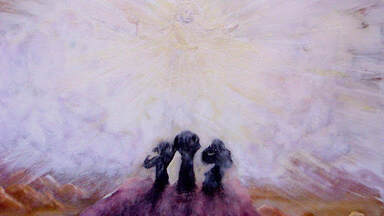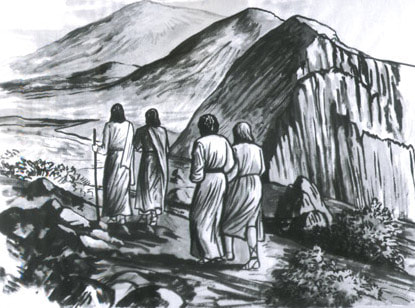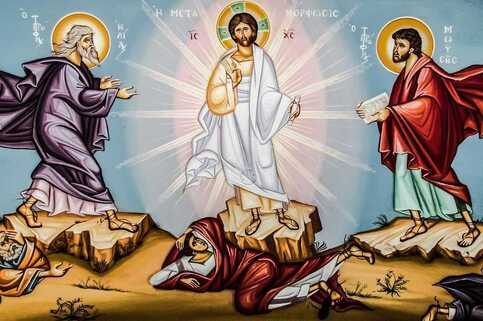 Young at Heart Message Today is the last Sunday in the season of Epiphany, and it is also known as Transfiguration Sunday. I find that a lot of people don’t really understand the Transfiguration, and I will admit that it can be hard for pastors to explain as well. So I thought I would try to creatively elaborate on the scripture story we heard so that we might understand it better. This story is adapted from Gary Neal Hansen’s blog, garynealhansen.com. Here is what happened on the mountain that day… One day, Jesus and his friends were camping at the bottom of a mountain. Jesus said, “Hey! Peter, John, and James – come with me!” Peter asked, “Where are we going?” “We’re going for a hike together,” Jesus said. “Just the four of us. Up this mountain.” “Oh man,” said Peter. “Do we have to? I was looking forward to just relaxing today.” “Look Peter,” Jesus said. “I want to go up there and have some good prayer time. It’ll be like a little retreat. And I want you three with me because you’re my closest friends. OK?” “Alright,” Peter said. So they headed up the trail. After a while, when they were pretty high up on the mountain, Jesus said, “This looks like a good place. You guys wait over there while I pray, OK?” James said, “Boy, I’m tired after hiking all the way up here. I think I’m going to take a nap while you pray.” But Jesus said, “I’d rather you all stayed awake. Hey, I know! How about you pray, too?” “Okay,” James said. “But I don’t know much about praying.” “Oh,” said Jesus. “Well, I’ll teach you more about praying another time. For today, just watch me.” So they all tried to stay awake and watch Jesus. While they watched, some very surprising things started to happen. First, Jesus seemed to shine with light. Then his clothes became blindingly bright. He was like the sun on a summer day! Peter, James, and John shielded their eyes from the glare, but they kept watching. Suddenly they saw that Jesus wasn’t alone. Two other men were standing there, talking to him. “Who are those guys?” asked Peter.
“I don’t know!” said John. “Let’s listen and see if we can figure it out.” They missed the start of the conversation, but one of the strangers said, “It will be kind of like the first Exodus – when I led the people of Israel out of slavery in Egypt.” “Right!” said the other one. “You parted the waters of the Red Sea. Just like later, when I parted the waters of the River Jordan!” “Hey you guys,” said Jesus. “You know it wasn’t really you parting the waters!” “OK, fine,” said the first guy. “God did the miracle. But I had to be there and raise my staff, and I had to have faith in God helping us.” “Yeah,” said the second guy. “God parted the waters, but I had to smack the river with my cloak.” “Hey!” said John. “That must be Moses and Elijah!” “That’s right!” said James. “Moses led the Exodus of Israel through the Red Sea, and Elijah parted the River Jordan!” “Shhh,” said Peter. “I want to hear what they’re saying.” “Okay,” said James. “But don’t be so bossy.” “The point,” Moses told Jesus, “is that you’re leading an exodus, too – a NEW exodus. What you do in Jerusalem will lead the people out of their slavery to sin.” “Right,” said Elijah. “You’ll lead them through the waters to freedom.” “Waters?” said Jesus. “Am I supposed to part the Sea of Galilee or something?” “No,” said Moses. “They’ll all go through the waters of baptism.” Just about then Peter stood up and said, “Wow Jesus! This is so cool! You know what we should do? We should build three little houses, you know? One for each of you. Then you could live up here, and the people could come up and talk to you about their problems! If they get sick, you could heal them. Or if they don’t understand the law they could ask Moses! I mean, he wrote it, right? And if they’re worried about the future they could ask Elijah, because, you know, he’s a prophet!” John started tugging Peter’s sleeve. “Peter! Sit down!” he said. And honestly, Peter didn’t know what he was talking about. He, John, and James were terrified of all that had happened, and in his fear, he thought staying on top of the mountain would be easier and less scary than doing the work Moses and Elijah had given Jesus to do. But then a thick dark cloud rolled in on the mountain. Everything got so foggy that Peter, James, and John couldn’t see a thing. And from the middle of the cloud came a voice: What you should really do is listen to Jesus! He’s my son! Jesus is my chosen one! But then the cloud cleared—and Moses and Elijah were gone. It was just Jesus. And Jesus looked normal again. They went back down the mountain. But they didn’t tell anybody what they’d seen. Not for a long time. The Message So, the Transfiguration is clear as mud now, right? It is important to note that just prior to today’s scripture reading, Jesus was teaching the disciples a hard truth about the cost of discipleship. He was predicting his own suffering, death, and resurrection. And this had already increased fear among the disciples. And then this experience of blinding light and seeing figures from the past happens. So it makes sense that the disciples who saw this were afraid. Peter’s suggestion that they pitch tents and just stay on the mountain forever was prompted by his fear – fear of what just happened, but also fear of losing Jesus. If Jesus could stay on that mountain top with Moses and Elijah, protected and safe, then perhaps his death would not come in the way he predicted six days prior. But of course, Jesus knows he must move forward. His disciples may be afraid for him, but he is not afraid of his imminent death. And I’m not sure that his disciples are as afraid of Jesus’s death as they are of the change that his death would bring. Jesus leaving them would mean they would lose their teacher. And, perhaps more importantly, it would also mean they would have to do the work Jesus started. We are all human here, and we know what this is like. When someone who had done hard work for us leaves or passes away, it can be daunting and overwhelming to try to take over that work on their behalf. In this case, it wasn’t hard labor or task-oriented work the disciples would have to take over. It was a call from God. It was service to God in Jesus’s place. And that was scary. It would be a huge change for them. We can imagine what this might have been like, because it is human nature to resist change. We don’t like it when things change around us, and we especially don’t like it when we are forced to change ourselves. And the disciples were no different than we are today. We are no different than they were. Sometimes, we know we need to change. And sometimes, change is forced on us. We may want to be like Peter – grasping at anything to try to keep things the way they are right now. And yet, we are pushed toward the future – toward change and uncertainty – out of necessity. We can only move forward if we are open to the possibilities of change. This is true for us personally, and it’s true for us as a church family. This church has been in transition and going through change for several years now. And it may feel like we’re past that, and that things will settle down. I hope that is true! But I also hope that we don’t try to pitch our tents on top of the mountain and hold onto this present moment when God may be calling us to continue moving forward and looking to the future. What does that future look like? Well, we aren’t Jesus, so we can’t predict what our future looks like. But we can be open to possibilities, open to change, and excited for the future. We can watch and listen for God’s guidance, and when we feel the push for something new and different, we can choose to lean into that nudge with joy and grace. May we continue to move forward, and may we find joy in change and transformation, both in our individual lives, and in the life of our church. Amen. Let us pray: Gracious and loving God, there are often times when we would rather do like Peter suggested and pitch our tents in the present moment, holding on to feelings of happiness, joy, or contentment, and avoiding the unknown future. But God, we pray for your wisdom and guidance in these moments, and your encouragement to keep moving forward, unafraid of what the future holds for us. Spark in us a flame of excitement for the future, and courage to walk into the unknown with the assurance that no matter what the future holds, you will be walking with us, holding our hands when we feel unsure, and carrying us when we feel weary and ready to turn back. All of this we pray in Your name. Amen.
0 Comments
|
AuthorRev. Jamie Almquist is the pastor at Good Shepherd Moravian Church in Calgary. Archives
July 2024
Categories
All
|



 RSS Feed
RSS Feed